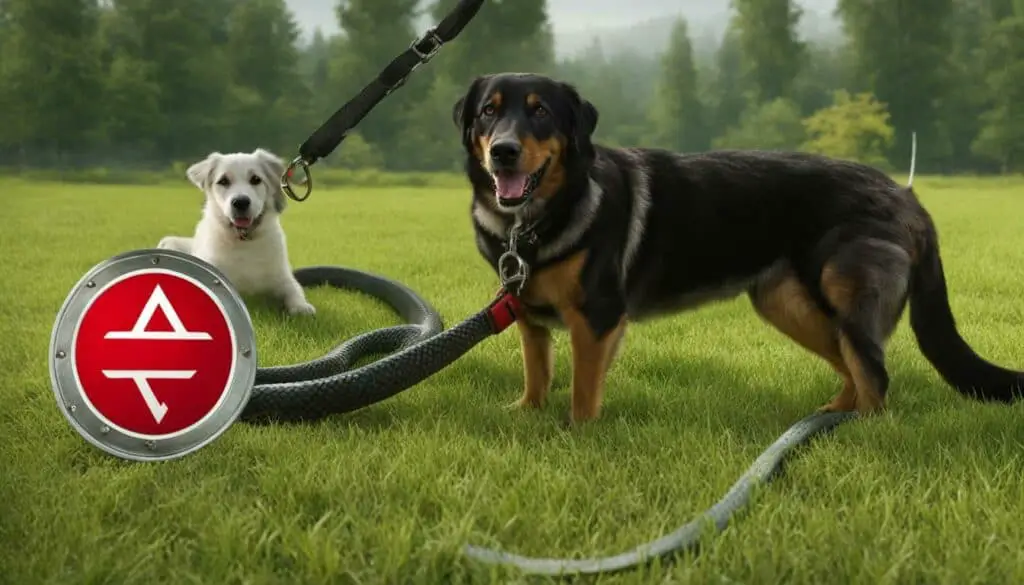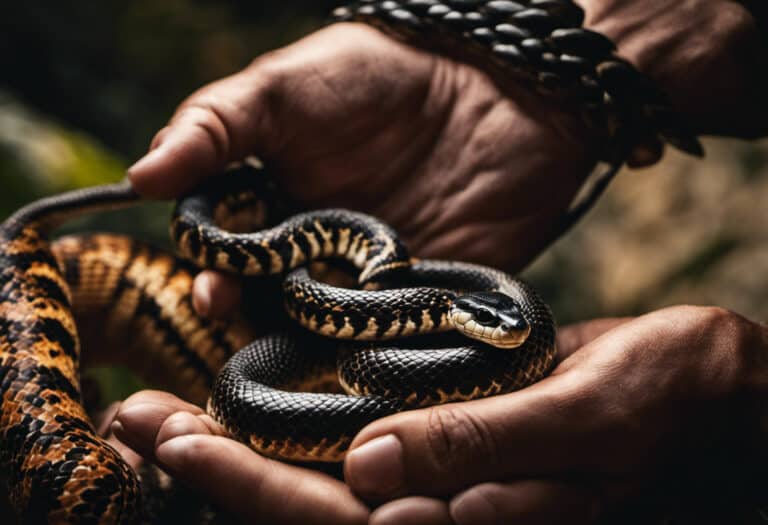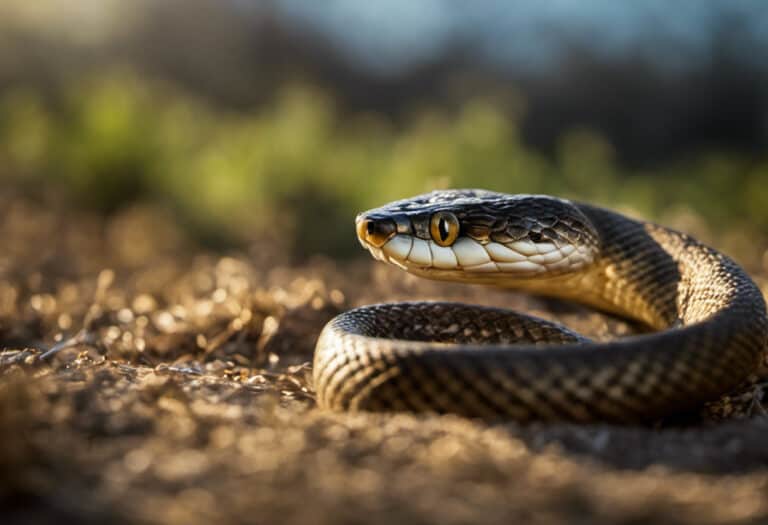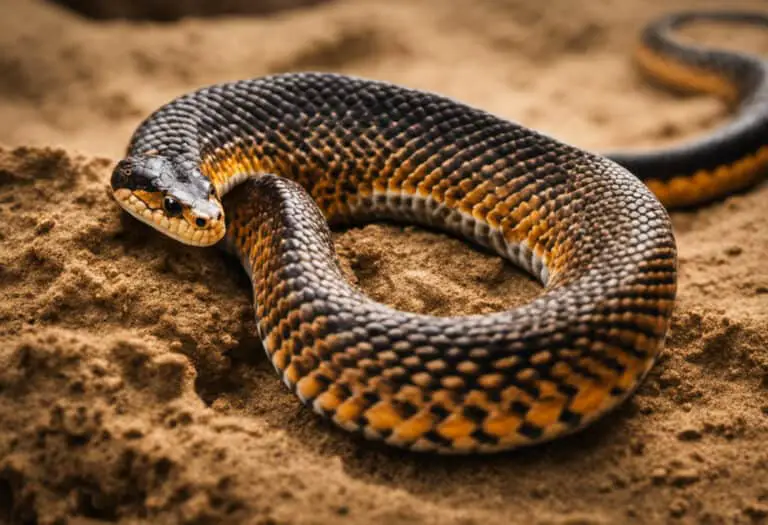Are Grass Snakes Dangerous to Dogs? Assessing the Risk
If you’re a pet owner, you’re likely concerned about the safety of your furry friend. If you live in the UK, you may have heard of grass snakes and wondered if they pose a risk to your dog. While these snakes are not typically venomous, they can still bite and cause discomfort or infection.
Grass snakes and adders are the two snake species native to the UK. Grass snakes are larger but not venomous, while adders are venomous and pose more danger. Grass snakes are usually found near ponds or in meadows and can stay submerged in water for up to an hour. Although they are not likely to pose a threat to pets, they can bite if provoked, leading to pain and potential risk of infection. Adders, on the other hand, are venomous snakes and their bites require immediate veterinary attention, as they can be fatal in some cases. It is important to be cautious and vigilant when dogs are in snake-prone areas, and any signs of bites, such as puncture wounds, swelling, pain, or unusual behavior, should be examined by a veterinarian. It is recommended to seek veterinary advice and consider dog insurance to cover the cost of treatment in case of unexpected incidents.
Key Takeaways:
- Grass snakes are not typically venomous, but they can still bite and cause discomfort or infection.
- Adders are venomous and pose a greater risk to dogs.
- Dogs should be kept away from snake-prone areas and monitored for signs of bites.
- Any signs of snake bites should be examined by a veterinarian immediately.
- Consider getting dog insurance to cover the cost of treatment in case of unexpected incidents.
Understanding Grass Snakes: Characteristics and Behavior
Grass snakes, although on the larger side, are not venomous and are less likely to pose a threat to dogs. These non-venomous snakes can grow up to 2 meters in length, with a greenish-grey color and a yellow band at their head, as well as a darker pattern of scales down their backs.
Grass snakes are usually found near ponds or in meadows and can stay submerged in water for up to an hour. If they feel cornered or threatened, they may bite, which can penetrate the skin and cause pain and the risk of infection. However, unlike adders, grass snakes are not aggressive and will often flee when startled.
It’s important to note that although grass snakes are less likely to pose a danger to dogs, encounters between dogs and snakes are not uncommon. If a snake bites your dog, it’s crucial to seek immediate veterinary attention. Symptoms of a snake bite on a dog include puncture wounds, swelling, nervousness, drooling, breathing problems, and seizures.
If you encounter a grass snake while out with your dog, it’s best to keep your distance and avoid startling the snake. Keep your dog on a leash and supervise them at all times to prevent any accidental encounters. This information about grass snakes and their behavior aims to increase understanding and promote proper action in case of an encounter or snake bite.
Grass Snake Bites and Their Impact on Dogs
If attacked, grass snakes may bite and their bites can penetrate a dog’s skin, causing pain and the risk of infection. However, grass snakes are not venomous, and their bites are generally less severe than adder bites. It is essential for dog owners to take preventative measures to reduce the risk of snake bites and to recognize the signs of a bite if one occurs.
If you suspect your dog has been bitten by a grass snake, it is crucial to seek veterinary attention immediately. Even non-venomous snake bites can carry the risk of infection, and it is important to treat the bite like an open wound. Signs of a snake bite may include puncture wounds, swelling, nervousness, drooling, and breathing problems. It is also important not to attempt to suck the bite site, as this can lead to further infection.
To protect your dog from grass snakes, it is recommended to keep your dog on a leash when in areas where snakes may be present. You can also create a barrier around your yard using snake fencing or mesh. If you live in an area where adders are present, it is particularly important to take preventative measures such as keeping grass short and avoiding areas where adders may be present.

Being prepared and knowing what to do in the event of a snake bite can help save your dog’s life. Remember to stay calm, seek veterinary attention immediately, and take steps to prevent future snake encounters. By taking these precautions, you can keep your dog safe and healthy.
Adders: Venomous Snakes and Their Threat to Dogs
Adders, on the other hand, are venomous snakes and can be dangerous if they bite a dog. These snakes are small and slender, with a distinct V-shaped marking on their heads. Adders can be found on the edges of fields and woodlands, as well as sandy areas. If a dog is bitten by an adder, it is essential to seek immediate veterinary attention and administer the appropriate antidote.
Symptoms of a snake bite in dogs include puncture marks, swelling, nervousness, drooling, difficulty breathing, vomiting, and seizures. If you suspect that your dog has been bitten by an adder, do not hesitate to take them to the vet, even if the symptoms seem mild at first.
Prevention is key when it comes to adder bites. Keep your dog on a leash when walking in areas where adders are known to inhabit, and avoid letting them go off-trail or off-leash. If you do encounter an adder with your dog, slowly and calmly back away to avoid provoking the snake.
Overall, it’s important for dog owners to be aware of the risks that snakes, including adders, can pose to their pets. Familiarize yourself with the signs of snake bites and seek veterinary help promptly if you suspect your dog has been bitten. By taking preventative measures and knowing what to do in case of an emergency, you can help keep your furry friend safe in areas where snakes may be present.

Recognizing Snake Bites on Dogs and Seeking Treatment
It can be challenging to spot a snake bite on a dog, as snakes usually keep themselves hidden. In the UK, grass snakes and adders pose a potential threat to dogs. While grass snakes are not venomous, their bites can still be painful and lead to possible infections. On the other hand, adders are venomous and require immediate veterinary attention and an antidote.
It’s important for pet owners to regularly check their dogs for any signs of snake bites, such as tender or sore spots on their body. Symptoms to watch out for include puncture wounds, swelling, bruising, nervousness, drooling, breathing difficulties, vomiting, seizures, or lameness. If any of these symptoms are observed, immediate action should be taken.
If your dog has been bitten by a snake, it’s important to stay calm and contact your nearest vet as soon as possible. Refrain from sucking the bite, as this can cause more harm than good. Instead, bathe the affected area in cold water to help control the swelling, and keep your pet quiet and still while transporting them to the clinic. This will help prevent the venom from spreading throughout their body.
Prevention is key when it comes to snake bites. Dogs should be kept on a leash in areas known to have snakes, and owners should be cautious when walking or hiking. Knowing the symptoms of snake bites and seeking prompt veterinary treatment can greatly increase the chances of a positive outcome for your furry friend.

Remember, your pet’s safety is in your hands! Be vigilant and take preventative measures to keep them safe from snake bites.
Conclusion
In conclusion, while grass snakes are not venomous and pose a lower risk to dogs, adders can be dangerous if they bite. As a dog owner, it is essential to be aware of the potential risks of snake bites and take preventative measures to protect your furry friend.
If you live in an area where snakes are present, it is important to keep your dog on a leash and supervise them closely during walks. Teaching your dog to avoid snakes can also be helpful. If you suspect your dog has been bitten by a snake, it is crucial to remain calm and seek veterinary attention immediately.
Watch out for symptoms such as puncture marks, swelling, nervousness, drooling, and breathing problems, among others. Do not try to suck the bite site, as this can cause further harm. Instead, contact a veterinarian and follow their advice. Cold water can help control swelling, and minimizing the dog’s movement can prevent venom from spreading.
Remember, being prepared, staying vigilant, and seeking prompt veterinary care are crucial in dealing with snake bites and ensuring the safety of dogs. By taking the necessary precautions and knowing what to do in case of an emergency, you can help protect your canine companion from the risks of snake bites.
FAQ
Q: Are grass snakes dangerous to dogs?
A: Grass snakes are generally not dangerous to dogs as they are non-venomous. However, if attacked or cornered, they may bite, causing pain and the risk of infection.
Q: How can I protect my dog from grass snake bites?
A: Keeping your dog on a leash in areas known to have snakes and being aware of your surroundings can help prevent encounters with grass snakes. Regularly checking your dog for any suspicious marks or injuries after walks is also important.
Q: What should I do if my dog is bitten by a grass snake?
A: If your dog is bitten by a grass snake, treat the bite as an open wound and seek veterinary attention. It is important to have the bite properly assessed and treated to prevent infection and ensure your dog’s well-being.
Q: Are adders dangerous to dogs?
A: Yes, adders are venomous snakes and can be dangerous if they bite a dog. Immediate medical or veterinary attention is required in case of an adder bite.
Q: How can I recognize a snake bite on my dog?
A: Look for two minor puncture marks along with bruising and potentially bleeding. Swelling may develop within 2 hours. Other symptoms can include nervousness, drooling, breathing problems, vomiting, lameness, and seizures.
Q: What should I do if my dog is bitten by an adder?
A: If your dog is bitten by an adder, stay calm and contact the nearest vet immediately. Inform them that your dog has been bitten by an adder so they can have the necessary antidote ready. Do not suck the bite site, bathe the area in cold water, and if possible, carry the dog to minimize the spread of venom.






